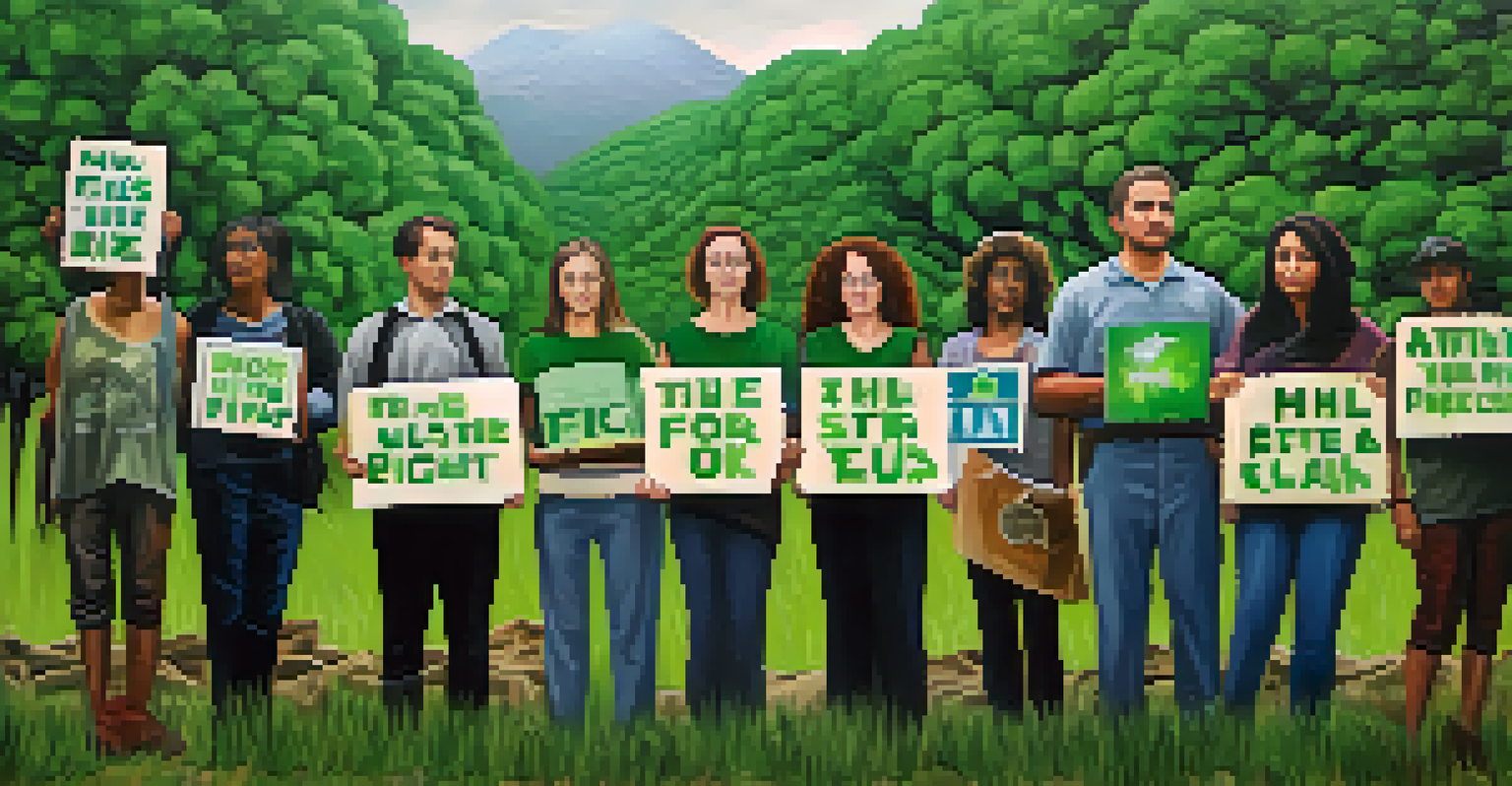Influential Documentary Filmmakers Who Changed the Genre

John Grierson: The Father of Documentary Filmmaking
John Grierson is often hailed as the father of documentary filmmaking, having coined the term 'documentary' in the 1920s. His work emphasized the importance of social issues and storytelling, setting a foundation for future filmmakers. Grierson's films, such as 'Drifters' (1929), showcased the lives of fishermen, blending artistry with social commentary.
Documentary filmmaking is not just about telling a story; it's about finding the truth within it.
His approach was groundbreaking at the time, as he believed that film could be a powerful tool for education and social change. By focusing on real-life subjects and experiences, Grierson encouraged audiences to engage with the world around them. This philosophy not only influenced his contemporaries but also paved the way for future generations of documentarians.
Grierson's legacy lives on, as he inspired many filmmakers to explore the human condition through documentaries. His ability to merge art with activism remains a guiding principle for those who aim to create impactful narratives. Today, the genre owes much of its evolution to his vision and dedication.
D.A. Pennebaker: Pioneering Direct Cinema
D.A. Pennebaker is known for his role in developing the 'Direct Cinema' style of documentary filmmaking, which emphasizes a naturalistic approach. His groundbreaking film 'Don’t Look Back' (1967), featuring Bob Dylan, captured intimate moments without scripted dialogues, allowing audiences to connect with the artist authentically. This style revolutionized how documentaries were made and perceived.

Pennebaker believed in immersing the audience in the experience rather than manipulating it with heavy editing or narration. This approach gave rise to a more engaging and spontaneous form of storytelling, breaking away from traditional documentary conventions. His techniques have inspired countless filmmakers to adopt a more observational style.
Pioneers Shaping Documentary Filmmaking
Influential figures like John Grierson and Barbara Kopple have laid the groundwork for documentaries that advocate for social change and highlight real-life issues.
His work showcases how powerful and evocative documentaries can be when they allow life to unfold naturally on screen. Pennebaker's influence is still evident today, as many modern filmmakers continue to explore the boundaries of real-life storytelling. His commitment to authenticity has forever changed the documentary landscape.
Werner Herzog: Blurring the Lines Between Fact and Fiction
Werner Herzog is a distinctive figure in the documentary world, known for his unique storytelling style that often blurs the lines between fact and fiction. His films, such as 'Grizzly Man' (2005), explore the complexities of human nature and the environment, often with a philosophical twist. Herzog's narrative-driven approach challenges viewers to ponder deeper questions about existence.
The cinema is a place where you can tell the truth and tell it in a way that people will care about it.
Herzog's documentaries are more than just factual accounts; they encapsulate a poetic vision that engages the audience emotionally. By incorporating surreal elements and personal anecdotes, he invites viewers into a rich, imaginative experience. His work has redefined what a documentary can be, pushing boundaries and encouraging creativity.
Through his exploration of extreme subjects and captivating narratives, Herzog has influenced a generation of filmmakers. His ability to weave storytelling with profound themes has made his documentaries both entertaining and thought-provoking. Today, his legacy continues to inspire filmmakers seeking to break traditional molds.
Barbara Kopple: Advocacy Through Documentation
Barbara Kopple is renowned for her powerful documentaries that advocate for social change, notably through her Oscar-winning film 'Harlan County, USA' (1976). This film chronicles a coal miners' strike, providing an intimate look at labor rights and community struggles. Kopple's commitment to authenticity and empathy shines through in her work, making her a pivotal figure in the genre.
Kopple's films often highlight marginalized voices, shining a light on issues that are frequently overlooked. By immersing herself in the communities she documents, she captures raw emotions and genuine experiences, fostering a deeper understanding of the subjects. Her advocacy-driven approach has inspired many filmmakers to use their craft for social good.
Innovative Styles Transform Storytelling
Filmmakers such as D.A. Pennebaker and Errol Morris have revolutionized documentary storytelling through naturalistic approaches and interrogative techniques.
Her impact on documentary filmmaking is profound, as she has consistently pushed for representation and justice through her storytelling. Kopple's work serves as a reminder of the power of documentary films in creating awareness and sparking conversations. Today, her influence can be seen in many socially-conscious documentaries that aim to evoke change.
Errol Morris: The Art of Interrogative Storytelling
Errol Morris is a master of interrogative storytelling, using his unique style to explore complex narratives and human psychology. His acclaimed film 'The Thin Blue Line' (1988) not only uncovered the truth behind a wrongful conviction but also showcased the power of documentary as a tool for justice. Morris's innovative use of reenactments and interviews set a new standard for storytelling in the genre.
Morris believes that the way stories are told can significantly impact their perception. By employing a distinctive approach that mixes interviews with stylized visuals, he engages the audience in a thought-provoking exploration of truth. His films often challenge viewers to question their understanding of reality and the nature of truth itself.
His work has influenced many filmmakers to experiment with narrative techniques, pushing the boundaries of traditional documentary forms. Morris's commitment to uncovering hidden truths has made him a respected figure in the industry. Today, his techniques continue to inspire a new wave of documentarians eager to innovate.
Agnès Varda: The Godmother of the New Wave
Agnès Varda, a key figure in the French New Wave, brought a fresh perspective to documentary filmmaking with her personal and poetic style. Varda's films, such as 'The Gleaners and I' (2000), reflect her unique ability to blend personal narrative with social commentary. Her distinctive voice and innovative techniques have left an indelible mark on the genre.
She often incorporated elements of her own life into her documentaries, creating a sense of intimacy and connection with her audience. Varda's willingness to explore themes of memory, identity, and aging resonates deeply, making her work both relatable and poignant. Her films challenge traditional documentary norms, encouraging filmmakers to embrace their individuality.
Future Trends in Documentary Genre
The documentary landscape is evolving with new technologies and diverse narratives, allowing underrepresented voices to share impactful stories.
Varda's legacy is evident in the way contemporary filmmakers approach storytelling. Her emphasis on authenticity, creativity, and emotional depth continues to inspire a new generation of documentarians. As the godmother of the New Wave, she has proven that documentaries can be as expressive and artistic as any other film genre.
Josh Fox: Environmental Activism Through Film
Josh Fox has made significant contributions to documentary filmmaking, particularly in the realm of environmental activism. His film 'Gasland' (2010) brought widespread attention to the dangers of hydraulic fracturing, illustrating the impact of fracking on communities and the environment. Fox's work is marked by a passionate commitment to raising awareness of ecological issues.
By combining personal narratives with investigative journalism, Fox creates compelling documentaries that resonate with viewers. His ability to weave storytelling with activism engages audiences and motivates them to take action. Fox's films serve as a reminder of the power of documentaries in influencing public opinion and policy.

His approach has inspired many filmmakers to tackle pressing social and environmental issues through their work. Fox's dedication to using film as a platform for change reflects a growing trend in the documentary genre, where storytelling and activism go hand in hand. Today, his influence can be seen in the rising number of documentaries focused on environmental and social justice.
The Future of Documentary Filmmaking
As technology continues to evolve, the future of documentary filmmaking holds exciting possibilities. Innovations such as virtual reality and interactive storytelling are opening new avenues for immersive experiences. Filmmakers are now able to engage audiences in ways that were previously unimaginable, enriching the documentary genre.
With the rise of streaming platforms, there is also an increasing demand for diverse narratives and voices in the documentary space. This shift allows for a broader representation of stories, opening the door for underrepresented communities to share their experiences. The future looks promising as new filmmakers emerge, bringing fresh perspectives to the genre.
As we move forward, the legacy of influential filmmakers will continue to shape the landscape of documentary filmmaking. Their dedication to storytelling and advocacy inspires new generations to push boundaries and explore important issues. The genre's potential for impact remains limitless, making it an exciting time for documentary lovers.